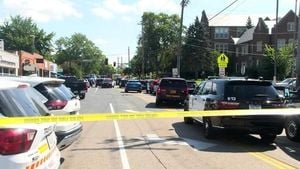On July 18, 2025, Department of Homeland Security Secretary Kristi Noem held a high-profile press conference in Nashville, Tennessee, spotlighting what she described as the "worst of the worst" criminal illegal immigrants apprehended in the state. The event, held at ICE's field office on Brick Church Pike, aimed to underscore the Trump administration's aggressive immigration enforcement policies and the department's commitment to public safety.
Secretary Noem began by highlighting the scale of arrests since President Donald J. Trump took office, stating that over 300,000 criminals and illegal immigrants have been detained across the United States, with 70 percent either convicted or facing pending criminal charges. "Bringing violent criminals to justice is our priority," she said, emphasizing the department's focus on individuals involved in serious offenses such as homicide, human trafficking, and child exploitation.
In Tennessee, Homeland Security Investigations in Nashville has arrested several individuals linked to foreign terrorist organizations and international gangs. Among those spotlighted was Kilmar Abrego Garcia, a Salvadoran national facing human smuggling charges. Noem did not mince words, calling him a "monster" with decades-long ties to a gang convicted of human trafficking. She expressed hope that a Nashville federal judge would deny his release and bring him to justice, despite ongoing legal battles surrounding his wrongful deportation to El Salvador earlier this year. "When that is done and that process is over, he should never be allowed to be free in the United States of America," Noem declared, adding that even if deported, she hopes he will be incarcerated in his home country for life.
The press conference also turned political as Noem sharply criticized Nashville Mayor Freddie O'Connell. She accused him of "doxxing" ICE agents by releasing their names, which she claimed endangered the agents and their families. Noem condemned the mayor's policies requiring city personnel to report interactions with federal immigration agents within 24 hours, a change implemented after immigration raids in May swept up nearly 200 people. "He doesn’t deserve to be mayor," she said bluntly, charging that his actions allow more children to be trafficked and families to suffer. Noem urged O'Connell to "stop playing politics" and instead support law enforcement efforts.
Further stoking tensions, Noem took aim at Belmont University, a private Christian institution in Nashville with about 9,000 students. She accused the university of obstructing federal immigration law by sheltering undocumented students and defying a Trump administration ban on campus diversity initiatives. A Belmont spokesperson responded by affirming the university's compliance with federal laws but did not address the allegations directly.
Amid questions about racial profiling, especially concerning ICE enforcement in predominantly Latino neighborhoods, Noem vehemently denied such claims. She admonished a reporter from Nashville Noticias, a Spanish-language outlet, stating, "Don’t you dare ever say that again." She insisted that every ICE operation is based on thorough investigative work and reasonable suspicion of criminal involvement. The Department of Homeland Security defended withholding names and charges related to most arrests in Middle Tennessee, citing legal requirements to ensure due process.
Noem also announced plans to increase the immigration enforcement presence in Nashville. Thanks to the substantial budget boost under President Trump's "One Big Beautiful Bill," ICE's funding soared from $8.7 billion to $27.7 billion. This will allow for "dozens more officers and agents" in the Nashville area, along with enhanced training, equipment, and investigative tools. "What the people in Nashville will see is obviously more individuals and more agents," she said, promising a more visible and capable immigration enforcement effort.
However, the local political landscape complicates these efforts. Unlike most Tennessee jurisdictions, Nashville has not entered into formal cooperation agreements with ICE, such as the 287(g) program, which enables local law enforcement to collaborate with federal immigration authorities. The Tennessee legislature passed a law this year making it a felony to vote for policies shielding people from immigration enforcement and approved incentives for local agencies to partner with ICE. Despite this, Nashville police have not joined the program. Instead, the Tennessee Highway Patrol, which does participate, conducted stops in Nashville on ICE's behalf in May 2025. These stops drew criticism from activists who alleged racial profiling, claims Noem dismissed as "not true."
The political drama extended to state Representative Justin Jones, a Democrat known for his activism. Jones was barred from attending a briefing at Nashville International Airport on July 17, where Noem announced new expedited security lanes for active-duty military members and their families. Jones' district includes the airport, and he sought to question Noem about the recent ICE arrests in Nashville. However, Noem's staff objected, and he was removed from the event despite passing a security check.
The press conference was met with small protests outside the ICE office, reflecting the community's divided views on immigration enforcement. Noem's tough rhetoric and pointed criticisms of local officials and institutions underscore the ongoing tensions between federal authorities and Nashville's political leadership.
Throughout the event, Noem displayed posters featuring four detainees, including Franklin Oswaldo Velasquez from El Salvador, labeled "SALVADORAN MURDER," and Jassim Jafaf Al-Raash, an Iraqi national labeled "IRAQI RAPE." These visuals were intended to reinforce the administration's message about targeting dangerous criminals.
Despite the forceful presentation, some data complicates the narrative. CBS News reported that of the 100,000 people deported between January and June 2025, only about 70,583 had criminal convictions, most for nonviolent offenses. This contrasts with Noem's assertion that 70 percent of arrested individuals have serious criminal charges.
As Nashville braces for an increased ICE presence and continued political clashes, the debate over immigration enforcement remains a flashpoint. Secretary Noem's visit and statements highlight the federal government's resolve to pursue aggressive immigration policies, while local leaders and communities grapple with the implications for civil rights, public safety, and social cohesion.





